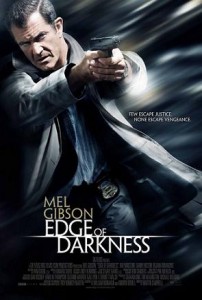The problem with reanimating long dead but beloved television shows is that like zombies they can turn around and rip your face off if you take your eye off them for even a second. “Edge of Darkness” is often lauded as the most influential political thriller of all time, so relocating it to contemporary Boston and cramming a six part series into less than two hours was always going to be a gamble.
Does it pay off? Well, it wont break the bank, but as a good old fashioned conspiracy thriller it will deal Mel back in the game and give him some chips to play with at the top table. Gibson’s Detective Thomas Craven is more than just a grieving father investigating the brutal slaying of his daughter; he’s a cathartic battlewagon bludgeoning out the star’s black demons on the faces of his supporting characters.
Gibson’s features have been hammered out of sheet metal, his eyes dulled by whatever darkness haunts his soul and his screen presence is all the more electrifying after nearly a decade away for it. His Craven doesn’t drink and wears his Catholicism firmly around his neck. This is Gibson firmly off the booze, but unrepentant about his faith and his Old Testament-style revenge as he rains down fire and brimstone onto corporate America represented by his late daughter’s employer the shadowy Norhmoor Company.
Northmoor’s headquarters would make Ken Adams proud-an old missile silo leased from the U.S. Government. Something’s defiantly afoot as everyone is petrified about revealing what goes on inside its spectacular glass vistas. Sure, Danny Huston’s tanned Bennett is all smiles and double breasted suits, but when he asks Craven about his daughter’s death,” What does it feel like?” It feels like someone just walked over your grave.
As the plot thickens, the mysterious Jedburgh materialises from the shadows to dispense cryptic advice that may help or hinder Craven’s investigation. Jedburgh speaks Latin and French, smokes fine cigars and enjoys a glass of red. He has one of those clandestine jobs that only seem to exist in the movies, answerable to nobody whilst manipulating everybody. “What’s that like not being anyone in particular?” Craven asks him.
Jedburgh is someone all right; he’s Ray Winstone stepping into Robert De Niro’s shoes at the last minute. His cockney conspirator neatly reverses Joe Don Baker’s Texan nightmare from the original series. Back in the Britain of the 1980s, a giant American seemed more threatening, more alien, more exotic in that grim decade than an Englishman abroad does today. Winstone’s Jedburgh does have the same doom laden silhouette as Baker, that lurking menace. When Jim Pine bleats indignantly, “I’m a United States Senator,” his rasping answer slits the words from his throat, “By what standard?”
Craven’s exchanges with Jedburgh are never less than intriguing, but what really saves “Edge of Darkness” from being a pumped up television movie is Craven’s grief for his daughter. She maybe dead, but her ghost inhabits every frame of the film. Campbell clearly grasps the double-edged sword of our need to record every aspect of family life as Emma Craven answers her dad back through photographs and DVDs, he even dreams about her in videotape. Does this help the grieving process or make it worse?
As Craven investigates his daughter’s life, we feel his unease of not only discovering the secrets she was harbouring, but also the realisation that he never really knew her. How many of us truly know our families? We cringe at what he might find as he checks through Emma’s mobile or empties out her bags onto her bed. Gibson handles these scenes with a stunned dignity, especially as he watches the last of her blood swirl down the sink after keeping a bloody flannel as the last physical reminder of his daughter.
“Edge of Darkness” does have the courage of its convictions and is as bloody and bleak as a mainstream thriller can be. Some of the sequences seem abrupt, as if an hour has been stripped from its running length, but this is all about Mel Gibson’s redemption as an actor. His performance is first rate and a reminder of the star power he once wielded. You’ll see what Gibson thinks of his comeback in the last frame. It remains to be seen if the audience agrees with him.
As Craven says, “You better decide whether you’re hangin’ on the cross or bangin’ in the nails.”

